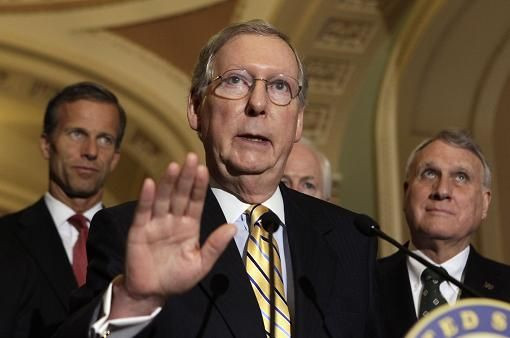McConnell Warns House GOP Against Bipartisan Support For Campaign Finance Reform

Senate minority leader Mitch McConnell, R-Ky., is so set on deflecting any new campaign finance reform laws that he is reportedly warning House Republicans against signing on to any bipartisan initiative to reform the system.
McConnell met with the House Republican Study Committee last week, at a time when Democrats have been attempting to gain Republican support for legislation to strengthen campaign finance disclosure laws, The Hill reports. The GOP leader specifically told members of the lower chamber to not sign on to any measure requiring more frequent disclosure of super PAC donor information, as well as requiring 501(c)4 political advocacy groups -- often called shadow money groups -- to finally reveal their donors.
“This is one of those issues where the public is with us in enormous numbers and where very significant Republicans are on the record supporting it,” Sen. Sheldon Whitehouse, D-R.I., told The Hill. “So they [Republicans] have to perform some very contorted pretzel configurations to dodge what they’ve said in the past and is obviously the right thing to do.”
Whitehouse is the sponsor of the Disclose Act, which would force outside groups spending more than $10,000 on political elections to disclose their donors. The bill has been blocked twice by a Republican filibuster.
The Rhode Island senator told The Hill that McConnell’s efforts to strengthen opposition is comforting only because it indicates he is anxious a reform measure would gain substantial support. He and Sen. John McCain, R-Ariz., are currently in talks to revive the Disclose Act in the 113th Congress, with Whitehouse adding that bipartisan meetings have already occurred on the staff level.
A majority of Americans, regardless of political affiliation, say the country needs more transparent campaign finance laws. According to one Public Campaign poll conducted on the second anniversary of the U.S. Supreme Court’s 2010 Citizen United decision, 55 percent of respondents strongly opposed the decision and said corporations should not have the same constitutional rights as individuals.
In the landmark decision, the court held the First Amendment prohibited the government from restricting independent political expenditures by corporations and unions because it would infringe on their right to free speech.
But opponents say the decision creates a slippery slope to political corruption by allowing outside groups to pour unlimited sums of money toward influencing an election, potentially giving corporate interests a louder political voice than the American people.
McConnell has a history of taking obstinate stands against campaign finance reform efforts. He launched a court challenge against a 2002 effort sponsored by McCain and then-Sen. Russ Feingold, D-Wis., who teamed up to pass reform legislation through the Democratic-controlled Senate.
Super PACs spent $644 million on independent expenditures during the 2012 campaign, according to the Center for Responsive Politics, which reports $418 million came from corporations and unions. The organization report total spending on the 2012 presidential and congressional campaigns surpassed $6 billion.
© Copyright IBTimes 2025. All rights reserved.



















